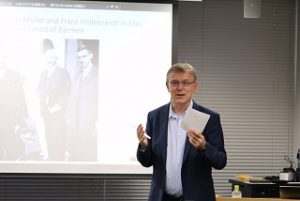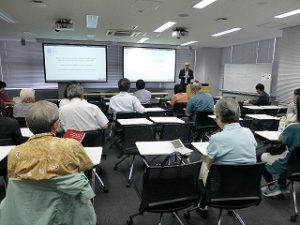講師 ベンヤミン・ツィーマン(イギリス シェフィールド大学歴史学教授)
広島平和研究所では、下記のとおりHPI研究フォーラムを開催しました。


1. テーマ
「マルティン・ニーメラーと西ドイツ反核平和主義の歴史:1950年~1984年」
2. 日時
2019年7月4日(土)18:00-20:00
3. 場所
広島市立大学サテライトキャンパス セミナールーム2
広島市中区大手町4-1-1大手町平和ビル9階(市役所本庁舎向い)
4. 講演の概要
ドイツの牧師であるマルティン・ニーメラーは、ヒトラーとナチ体制への抵抗運動で知られると同時に、1950年代から80年代初頭の西ドイツの反核平和運動を代表する人物としても知られています。しかし彼は、第一次世界大戦時にドイツ帝国海軍の軍人として従軍し、第二次世界大戦勃発時には、強制収容所にいながらドイツのために戦うことを志願していました。このような人物が、なぜ戦後に反核平和主義に転じ、西ドイツの平和運動の顔となったのでしょうか。本報告では、ツィーマン氏がニーメラーの足跡を追いながら、冷戦期の西ドイツにおける反核平和運動史の発展について明らかにします。
5. 講師の略歴
1964年ベルリン生まれ。歴史学者。ビーレフェルト大学(ドイツ)で博士号(哲学博士 Dr. phil.)を取得。2005年、シェフィールド大学(イギリス)に着任し、2011年より現職、ドイツ現代史を専門とする。主な研究領域は、19世紀~20世紀ドイツ史及び1945年以降の西欧史で、第一次世界大戦期の軍事・社会・文化に関する史的比較研究や20世紀における平和運動史研究については、特に定評がある。さらに、ツィーマン教授の研究分野は軍事史や宗教史にも及んでおり、執筆も多数。近著では、ドイツの福音主義神学者で反ナチ運動家のマルティン・ニーメラー(1892-1984)の伝記を完成させており、2019年8月に出版される予定。
HPI Research Forum on July 4, 2019
〝Martin Niemöller and the history of anti-nuclear pacifism in the Federal Republic, 1950-1984″
By Dr. Benjamin Ziemann, Professor, Department of History, University of Sheffield, United Kingdom
1. Topic
“Martin Niemöller and the history of anti-nuclear pacifism in the Federal Republic, 1950-1984"
2. Date and Time
July 4, 2019 (Thu.) 18:00-20:00
3. Venue
Seminar Room 2, Satellite Campus, Hiroshima City University
9F Otemachi Heiwa Building, 4-1-1 Otemachi, Nakaku, Hiroshima
4. Abstract of the Forum
Martin Niemöller (1892-1984) served in the Imperial German Navy as an officer and U-Boat Captain during the First World War. In 1919, he began to study Protestant theology. As a Lutheran pastor in the affluent parish of Berlin-Dahlem, Niemöller became the figurehead of the Confessing Church in its fight against the National Socialist faction in the Protestant church since 1933. On Adolf Hitler’s personal order, he was detained in Concentration Camps from 1938 to 1945. Yet in September 1939, the international press reported – correctly – that Niemöller had volunteered to fight in the Wehrmacht from his solitary confinement in the Sachsenhausen Concentration Camp.
In the post-war period, Niemöller became the most prominent German pacifist and the public face of the West German mass movements against nuclear weapons in the late 1950s and again in the wake of the 1979 NATO Dual Track Decision. How could a former career officer who had volunteered to fight for Nazi Germany become a prominent pacifist? Which perceptions informed Niemöller’s shift from militarism to a rejection of nuclear weapons? What was the rationale behind his anti-nuclear pacifism? And how did Niemöller’s peace activism resonate among the German public? These are some of the questions and themes that this talk will cover. By discussing the trajectory of Niemöller’s anti-nuclear pacifism from the 1950s to the 1980s, the talk will also introduce key turning points and developments of the peace movements in the Federal Republic during the Cold War.
5. Profile of Lecturers
Born in Berlin in 1964, Benjamin Ziemann is a German historian, with his PhD from the University of Bielefeld, who teaches at the University of Sheffield. His research covers a broad range of topics in German history during the nineteenth and twentieth centuries and in post-1945 Western European history. He is a renowned expert in the comparative military, social and cultural history of the First World War, and continues to conduct research on the First World War and on mass-violence in the twentieth century more generally. One of his long standing research interests is peace history and he is director of the Centre for Peace History at the Department of History, founded in 2009.
Dr. Ziemann is currently completing his biography of Martin Niemöller (1892-1984), a navy officer during the First World who became a Protestant pastor and figurehead of the Confessing Church during the Third Reich. This book, to be published with Deutsche Verlags-Anstalt in 2019, will not only offer the first primary-souce based account of the turbulent life of Niemöller, including his eight years in Sachsenhausen and Dachau Concentration Camps from 1938 to 1945 and his tireless campaigning for peace and disarmament in the decades since 1945. Through the prism of Niemöller’s life, the book will also offer a reflection on continuities in Germany’s twentieth century history and contested issues such as nationalism, religion, guilt and morality
